高中英语语法 连词
英语语法中的连词与从句

英语语法中的连词与从句英语语法中的连词与从句是构建复杂句子的重要组成部分。
连词用于连接句子、短语或单词,而从句是由主语和谓语构成的句子,可以在复合句中充当名词、形容词或副词。
一、连词与从句的分类1. 引导名词性从句的连词:(1)连词 that:用于引导宾语从句、主语从句、表语从句和同位语从句。
(2)连词 whether/if:用于引导宾语从句和主语从句,区别在于whether 是否由于可选择性而引入的疑问。
(3)连词 who/whom/whose/which/what/when/where/why/how:分别用于引导主语从句、宾语从句、定语从句、状语从句和名词性从句。
2. 引导特殊疑问句从句的连词:(1)连词 who/whom/whose/which/what/when/where/why/how:用于引导特殊疑问句从句。
(2)连词 whether/if:用于引导特殊疑问句从句,表示“是否”。
3. 引导时间、原因、条件、让步、目的、结果从句的连词:(1)引导时间从句的连词:when/while/as/once/before/after/since/until/till。
(2)引导原因从句的连词:because/as/since/now that/for。
(3)引导条件从句的连词:if/unless/so long as/on conditionthat/provided that/as if。
(4)引导让步从句的连词:though/although/even if/eventhough/while/whereas。
(5)引导目的从句的连词:so that/in order that。
(6)引导结果从句的连词:so that/such...that/so...that/enough...to。
二、连词与从句的使用规则1. 从句的位置:(1)宾语从句一般紧跟在动词或介词之后。
(2)主语从句常位于句首。
高中英语语法知识词法部分讲解连词

高中英语语法知识词法部分解说--------- 连词及练习一、观点连词 (conjunction.) 是用来连结单词, 短语 , 从句或句子的词。
连词是虚词,所以不作成分。
二、连词的分类:1. 连词按其组成分为:2)3)4) 1)简单连词关系连词分词连词短语连词,,,,如 : and, or, but, if, because ect.如 :both and, not only but also ect.如 : supposing, considering, provided ect.如 :as if, as long as, in order that ect.2. 连词按其性质分为1)并列连词, 如 : and, or, but, for ect.用来连结并列的单词、短语、从句或分句。
2) 附属连词, 如 : that, whether, when, although, because ect. 用来连结名词性从句或状语从句。
三、连词的用法:并列连词 :1. 表示并列关系的连词有 : and, both and , not only but also , neither nor和as well as等。
1) and:和,并且A: 基本用法 :"and" 表示 " 和 "," 并且 " 的意思 , 用来连结平等关系的字和字, 片语和片语 , 句子和句子 .eg. ① I enjoy basketball , football and table tennis.② The weather becomes colder and colder.③He didn ’t go and she didn’t go either.他没去,她也没去。
B: 特别用法:祁使句后连结and, 有条件句作用, 此时 and=if you , you'llstraight on, and you'll see the library.=If you go straight on, you will see the library.2) both ⋯and⋯ : 既也,(二者) 都A andB + 谓语 ( 组成的词组作主语时, 谓语动词用复数 ) 。
高中英语语法词法第9章连词和感叹词
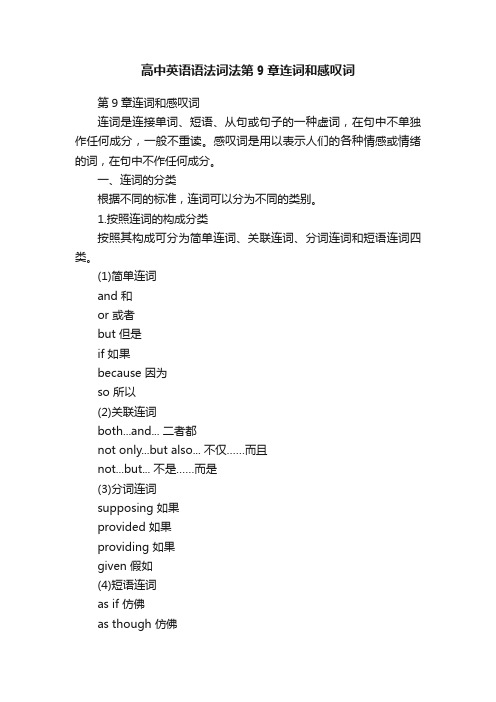
高中英语语法词法第9章连词和感叹词第9章连词和感叹词连词是连接单词、短语、从句或句子的一种虚词,在句中不单独作任何成分,一般不重读。
感叹词是用以表示人们的各种情感或情绪的词,在句中不作任何成分。
一、连词的分类根据不同的标准,连词可以分为不同的类别。
1.按照连词的构成分类按照其构成可分为简单连词、关联连词、分词连词和短语连词四类。
(1)简单连词and 和or 或者but 但是if 如果because 因为so 所以(2)关联连词both...and... 二者都not only...but also... 不仅……而且not...but... 不是……而是(3)分词连词supposing 如果provided 如果providing 如果given 假如(4)短语连词as if 仿佛as though 仿佛even if 即使even though 即使as long as 只要2.按照连词的性质分类按照性质,连词可分为并列连词和从属连词。
(1)并列连词and 和or 或者but 但是while 然而when 既然(2)从属连词that (无实义)whether 是否if 是否;如果unless 除非until 直到when 当……时before 在……之前after 在……之后since 自……以来because 因为although 虽然though 尽管as if 仿佛as though 仿佛even if 即使even though 即使as long as 只要二、并列连词并列连词主要用来表示并列关系、转折关系、选择关系、因果推理关系等。
1.表示并列关系表示并列关系的连词主要含有“和”、“补充”、“增加”等意思。
用来表达并列关系的连词有如下几个:and 和both...and... 二者都neither...nor...既不……也不……either...or...或者……或者……not only...but also不但……而且……as well asI used to live in Paris and London.我过去住在伦敦和巴黎。
高考英语语法填空-连词考点及练习
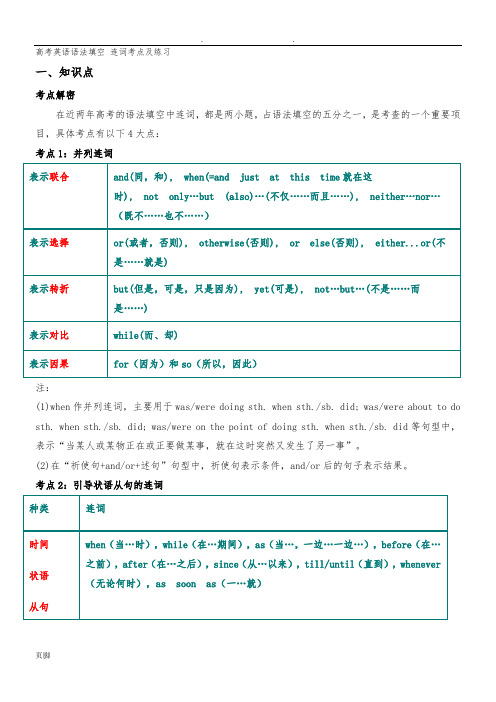
高考英语语法填空连词考点及练习一、知识点考点解密在近两年高考的语法填空中连词,都是两小题,占语法填空的五分之一,是考查的一个重要项目,具体考点有以下4大点:考点1:并列连词注:(1)when作并列连词,主要用于was/were doing sth. when sth./sb. did; was/were about to do sth. when sth./sb. did; was/were on the point of doing sth. when sth./sb. did等句型中,表示“当某人或某物正在或正要做某事,就在这时突然又发生了另一事”。
(2)在“祈使句+and/or+述句”句型中,祈使句表示条件,and/or后的句子表示结果。
考点2:引导状语从句的连词考点3:引导名词性从句的连接词名词性从句有主语从句、表语从句、宾语从句和同位语从句。
引导这些从句的连词有:(1)连词that:只起连接作用,没有任何意思,不作任何句子成分,在宾语从句中可省略。
(2)连词whether:有“是否”之意,但不作句子成分;引导宾语从句时,还可用if。
(3)连接代词:who(m), whose, which, what等均有各自的意义,在从句中作主语、宾语、定语等。
其中what除有“什么”“多么”外,还有“所……的”之意,相当于the thing(s) that…。
(4)连接副词:when, where, why, how等,有意义,在从句中作状语。
(5)whoever, whatever, whichever等也可引导名词性从句,意为“无论/不管……”。
考点4:引导定语从句的关系词定语从句就是在复合句里充当定语的从句,它通常紧靠在所修饰的名词或代词后面。
引导定语从句的关系代词和关系副词及使用场合如下表:注:(1)先行词是occasion常用when,先行词是case, situation, scenes等时常用where。
「高中英语」英语语法——从属连词用法分析

「高中英语」英语语法——从属连词用法分析英语从属连词用法分析从引导状语从句的连词的意义来看,可分为引导时间、原因、结果、目的、让步、条件、方式、比较、地点等名种从句的连词。
(1)引导时间状语从句的从属连词①此类连词主要有:when, while, after, before, as, as soon as , until, till, once, since, whenever, no sooner...than, hardly/barely/scarcely...when等。
When I got to the theatre, I found that they had sold all the tickets.当到达剧院时,我发现票已售完。
We should strike while the iron is hot.我们要趁热打铁。
Since he entered the university, he has made great progress in his studies.They kept on working until it became dark.他们一直工作到天黑。
Once you begin , you must go on. 你一旦开始,就必须继续下去。
You seem to have a ready-made answer, whenever I ask you a question.每逢我问你问题, 你总好象有现成的答案。
Now (that) you are here, you'd better stay.你既然来了,那就不要走了。
No sooner had they got to the field than it began to rain.他们刚到田里就开始下雨了。
Hardly had he set foot on his native land when he felt comfortable.他一踏上祖国的土地就感到心情舒畅。
高中英语语法---连词及练习附答案

高中英语语法---连词及练习附答案连词在英语语法中是非常重要的一部分,它可以连接句子、短语和单个单词。
在写作和口语中,正确使用连词可以使句子更加清晰,也可以使信息之间的关系更加清晰。
以下是常见的连词类型及其用法:并列连词(Coordinating Conjunctions):并列连词用于连接结构相同的句子。
常用的并列连词有:and, or, but, so, yet, for, nor。
例句:- Kate is a doctor and her sister is a lawyer. (“and”是并列连词,连接了两个结构相同的句子。
)- John can play basketball or baseball. (“or”连接了两个并列的短语。
)从属连词(Subordinating Conjunctions):从属连词用于连接主句和从句。
从句可以是名词从句、形容词从句或副词从句。
常用的从属连词有:because, if, when, although, since, until。
例句:- I need to go to bed early because I have an important exam tomorrow. (“because”引导的是一个原因从句。
)连接副词(Conjunctive Adverbs):连接副词用于连接两个句子或短语,以表示它们之间的关系。
连接副词通常出现在句子的两个主句之间。
常用的连接副词有:however, therefore, moreover, nevertheless, consequently, etc.例句:- Jane likes to swim. However, she doesn't like to dive. (“however”连接两个句子,表示转折关系。
)- Tom is a good student. Therefore, he always gets good grades. (“therefore”连接两个句子,表示因果关系。
深圳外国语学校 高中英语语法 连词 讲义设计

连词并列句状语从句一.连词连词是一种虚词,它不能独立担任句子成分,而只起连接词与词,短语与短语以及句与句的作用。
分为并列连词(coordinating conjunction)和从属连词(subordinating conjunction) 两大类。
1.并列连词连接语法地位相同的结构, 比如:主语与主语,谓语与谓语,分词与分词,句子与句子,它要求前后两部分有相同的形式和语法作用;2.从属连词一般连接主句与从句,从句形式有宾语从句,定语从句等。
含有从句的句子叫复合句。
二.并列连词和并列句(一)表示并列、联合关系的并列连词:and, both…and, not only…but also, as well as等。
1. 可以连接两个句子,也可以并列主语、谓语、宾语、表语、状语等成分:and用于肯定句中English and French are two important working language in the UN.Go and fetch something to eat.We go traveling in spring and autumn.They didn't catch the bus, and (they) had to stay in a hotel for the night.Use your head, and you will find a way to solve this problem.2. 可以并列主语、宾语、表语、状语、谓语等成分。
both…and连接并列主语时,谓语动词用复数形式。
Both New York and London have traffic problems.He can not only repair radios but also fix them.Language teaching is both a science and art.not only…but also连接并列主语时,谓语动词根据就近原则,与所靠近的成分保持数的一致。
高考英语语法专项-连词(详解与真题)
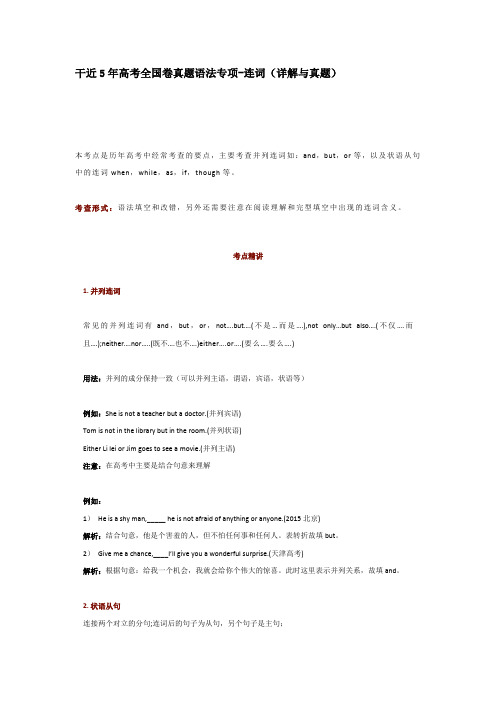
干近5年高考全国卷真题语法专项-连词(详解与真题)本考点是历年高考中经常考查的要点,主要考查并列连词如:and,but,or等,以及状语从句中的连词when,while,as,if,though等。
考查形式:语法填空和改错,另外还需要注意在阅读理解和完型填空中出现的连词含义。
考点精讲1. 并列连词常见的并列连词有and,but,or,not….but….(不是…而是….),not only…but also….(不仅….而且….);neither….nor…..(既不….也不….)either….or….(要么….要么….)用法:并列的成分保持一致(可以并列主语,谓语,宾语,状语等)例如:She is not a teacher but a doctor.(并列宾语)Tom is not in the library but in the room.(并列状语)Either Li lei or Jim goes to see a movie.(并列主语)注意:在高考中主要是结合句意来理解例如:1)He is a shy man,_____ he is not afraid of anything or anyone.(2015北京)解析:结合句意,他是个害羞的人,但不怕任何事和任何人。
表转折故填but。
2)Give me a chance,____I’ll give you a wonderful surprise.(天津高考)解析:根据句意:给我一个机会,我就会给你个伟大的惊喜。
此时这里表示并列关系,故填and。
2. 状语从句连接两个对立的分句;连词后的句子为从句,另个句子是主句;例如:If you can study hard,(从句) you will be successful.(主句)1) when, while ,as的用法都可以表示“当…..时候”;可以相互替换;注意:when还可以表示这时,突然的意思;例如:We are having a meeting when someone breaks into the room.(when这里表示突然)while可以表示然而,尽管等含义例如:He likes pop music,while I am fond of folk music.(表示对比关系)2)表示“一…….就……”的连词有:as soon as, once, immediately,instantly, the moment,the min ute, hardly……when……, no sooner…..than……;例如:As soon as I get home, I start to do my homework.3)容易混淆的连词有:as long as (只要);even if/even though即使;as if /as though 好像;now that 既然;in case 以防;万一;so that 以便于等4)让步状语从句(1)although与though可以引导让步状语从句,不能与but连用,但可以与yet连用。
英语语法知识——连词
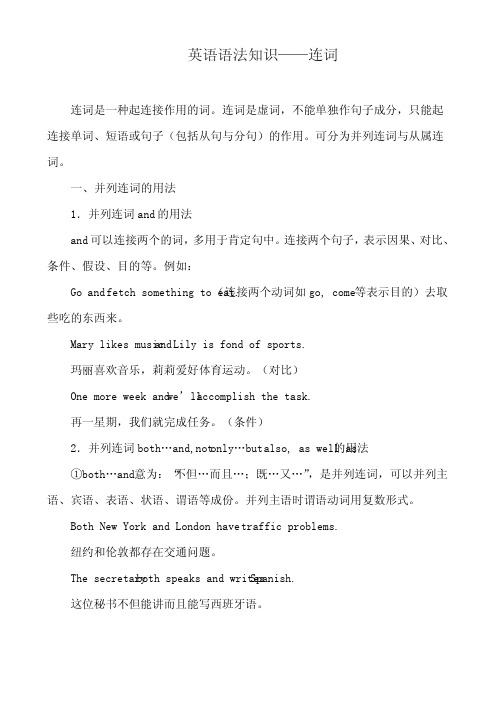
英语语法知识——连词连词是一种起连接作用的词。
连词是虚词,不能单独作句子成分,只能起连接单词、短语或句子(包括从句与分句)的作用。
可分为并列连词与从属连词。
一、并列连词的用法1.并列连词and的用法and可以连接两个的词,多用于肯定句中。
连接两个句子,表示因果、对比、条件、假设、目的等。
例如:(连接两个动词如go, come等表示目的)去取Go andfetch something to eat.些吃的东西来。
andLily is fond of sports.Mary likes music玛丽喜欢音乐,莉莉爱好体育运动。
(对比)One more week and we’ll accomplish the task.再一星期,我们就完成任务。
(条件)的用法2.并列连词both…and,not only…but also, as well as①both…and意为:“不但…而且…;既…又…”,是并列连词,可以并列主语、宾语、表语、状语、谓语等成份。
并列主语时谓语动词用复数形式。
Both New York and London have traffic problems.纽约和伦敦都存在交通问题。
Spanish.The secretaryboth speaks and writes这位秘书不但能讲而且能写西班牙语。
②not o nly…but also 意为:“不但...而且”,是并列连词,可以连接两个词,也可连接两个句子。
其中,but also 中的also可以省略。
not o nly…but also 可以连接句中所有的成份,连接并列主语时,其谓语动词根据就近原则,与所靠近的成分保持数的一致。
not o nly…but also 可以连接两个句子,not only 位于句首时, not only 后的句子要倒装。
Not only the students but (also) their teacher is enjoying the movie.不仅学生们津津有味地看着这部电影,而且他们的老师也是如此。
高中英语语法-连词(带习题)

before & after 在…之前或在…之后, as soon as, once 一…就… since &until 自从,直到 Until和till两者区别: 1. till不能用于句首 2. 用在否定句中,表示“直到…才”, 这个动作直 到until所表示的时候才发生。
A.If
C.Because 【解析】
B.While
D.As 考查状语从句的从属连词。句意为:尽管因
特网用途巨大,但我认为在网上花费太多的时间并不好。
while引导让步状语从句相当于although,故选B。 【答案】 B
④We had to wait half an hour ________ we had already booked a table. A.since C.until B.although D.before
4.我和他都不喜欢这首歌 Neither I nor he likes this song. 5.我的朋友们和我都不是老师 Neither my friends nor I am not teacher. 6.不仅妈妈而且孩子们都生病了。 Not only the mother but also the children are ill. 7.他不仅洗了衣服而且还打扫了房间 He not only washed the clothes but also cleaned the room
【解析】
考查连词辨析。做该类型的题目关键是看两
个分句间的关系。“我们等了半个小时”和“ 我们早已预定 了餐桌 ” 之间是转折关系,故选 although 。 although 引导让
步状语从句,意为“虽然,尽管”。干扰项 since 有“既然”
高考英语语法填空连词考点及练习
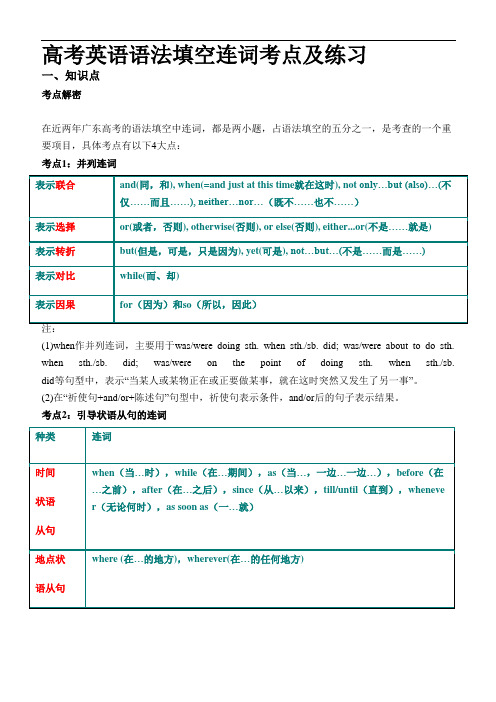
高考英语语法填空连词考点及练习一、知识点考点解密在近两年广东高考的语法填空中连词,都是两小题,占语法填空的五分之一,是考查的一个重要项目,具体考点有以下4大点:考点1:并列连词(1)when作并列连词,主要用于was/were doing sth. when sth./sb. did; was/were about to do sth. when sth./sb. did; was/were on the point of doing sth. when sth./sb. did等句型中,表示“当某人或某物正在或正要做某事,就在这时突然又发生了另一事”。
(2)在“祈使句+and/or+陈述句”句型中,祈使句表示条件,and/or后的句子表示结果。
考点2:引导状语从句的连词名词性从句有主语从句、表语从句、宾语从句和同位语从句。
引导这些从句的连词有:(1)连词that:只起连接作用,没有任何意思,不作任何句子成分,在宾语从句中可省略。
(2)连词whether:有“是否”之意,但不作句子成分;引导宾语从句时,还可用if。
(3)连接代词:who(m), whose, which, what等均有各自的意义,在从句中作主语、宾语、定语等。
其中what除有“什么”“多么”外,还有“所……的”之意,相当于the thing(s) that…。
(4)连接副词:when, where, why, how等,有意义,在从句中作状语。
(5)whoever, whatever, whichever等也可引导名词性从句,意为“无论/不管……”。
考点4:引导定语从句的关系词定语从句就是在复合句里充当定语的从句,它通常紧靠在所修饰的名词或代词后面。
引导定语从句的关系代词和关系副词及使用场合如下表:(1)先行词是occasion常用when,先行词是case, situation, scenes等时常用where。
(2)关系副词when和where有时可用“介词+which”代替,why可用for which代替。
高中英语语法——连词的用法

or = Study hard, _____ your math will be worse.
“and”意为“这样,那么”; “or” 意为 “否则” 。
考点二 :表转折的连词but 和however:
e.g. (他努力工作,但以失败告终。)
或 He is over sixty, but he works as hard as others. (2)“Because John was ill, so I took him to the doctor.”
同样,此句错误,
because 和 so 等关联词都不能同时使用。
--- 连词词组 : either A or B “或者A或者B” 【连接主语 neither A nor B “既不A也不B” 时,谓语
情境对话 :
Funny Husband (H) & Wife (W) about Shopping
H:“What are we going to do, my dear?”根据对话内容, W: “Go shopping.” 填入适当连词。 H:“We can do nothing except/but ___________shopping.” W:“In fact,neither younor I like shopping.” _______ _____ that H: “Why must you do the things _____ you don’t like?” W: “___ ___ Because my skirts are out of style, 或 so I want to buy a new one.” if W:(In the clothing shop.)…I don’t know___ they fit(适合) me. ” what/ which H: “I don’t know ____________ you really like. Just go inside and try them on.” H:(对seller笑笑) “Can you talk to me for a few minutes?” if/when/ as soon as S:Why? H:Because ___________ my wife sees (that) I am talking to other ladies, she will be angry at once and leave.
高考英语语法填空连词考点及练习

高考英语语法填空连词考点及练习1. 连词考点:and练习题:The sun was shining _____ the birds were singing.答案:and2. 连词考点:but练习题:He was tired, _____ he kept working.答案:but3. 连词考点:or练习题:Do you want tea _____ coffee?答案:or4. 连词考点:so练习题:It was raining, _____ we stayed inside.答案:so5. 连词考点:nor练习题:He didn't study, _____ did he pass the test.答案:nor6. 连词考点:yet练习题:She hasn't arrived _____.答案:yet7. 连词考点:because练习题:I didn't go to the party _____ I was sick.答案:because8. 连词考点:although练习题:_____ it was raining, he still went for a walk. 答案:Although9. 连词考点:while练习题:He played soccer _____ his sister watched. 答案:while10. 连词考点:when练习题:I was reading a book _____ the phone rang. 答案:when11. 连词考点:as练习题:_____ I was leaving, he arrived.答案:As12. 连词考点:since练习题:I haven't seen him _____ last week.答案:since13. 连词考点:until练习题:He didn't leave _____ I arrived.答案:until14. 连词考点:before练习题:He left _____ I could say goodbye.答案:before15. 连词考点:after练习题:He arrived _____ I had left.答案:after16. 连词考点:if练习题:_____ you need any help, just let me know.答案:If17. 连词考点:unless练习题:You won't pass the test _____ you study.答案:unless18. 连词考点:provided练习题:I'll come _____ you provide the transportation. 答案:provided19. 连词考点:since练习题:He's been sick _____ Monday.答案:since20. 连词考点:while练习题:He ate lunch _____ watching TV.答案:while21. 连词考点:although练习题:_____ he was tired, he kept working.答案:Although22. 连词考点:because练习题:I went to bed early _____ I was tired.答案:because23. 连词考点:but练习题:He's very busy, _____ he always finds time to exercise. 答案:but24. 连词考点:either...or练习题:You can have _____ tea _____ coffee.答案:either...or25. 连词考点:neither...nor练习题:He _____ studied _____ passed the test.答案:neither...nor26. 连词考点:if练习题:_____ you need anything, just let me know.答案:If27. 连词考点:unless练习题:You won't get a good grade _____ you study.答案:unless28. 连词考点:so练习题:It was raining, _____ we stayed inside.答案:so29. 连词考点:since练习题:I haven't seen him _____ last week.答案:since30. 连词考点:after练习题:He arrived _____ I had left.答案:after31. 连词考点:when练习题:I was reading a book _____ the phone rang. 答案:when32. 连词考点:as练习题:_____ I was leaving, he arrived.答案:As33. 连词考点:while练习题:He played soccer _____ his sister watched.答案:while34. 连词考点:before练习题:He left _____ I could say goodbye.答案:before35. 连词考点:until练习题:He didn't leave _____ I arrived.答案:until36. 连词考点:provided练习题:I'll come _____ you provide the transportation. 答案:provided37. 连词考点:so练习题:It was hot _____ we went swimming.答案:so38. 连词考点:nor练习题:He didn't study, _____ did he pass the test. 答案:nor39. 连词考点:yet练习题:She hasn't arrived _____.答案:yet40. 连词考点:because练习题:I didn't go to the party _____ I was sick.答案:because41. 连词考点:although练习题:_____ it was raining, he still went for a walk. 答案:Although42. 连词考点:while练习题:He ate lunch _____ watching TV.答案:while43. 连词考点:or练习题:Do you want tea _____ coffee?答案:or44. 连词考点:but练习题:He was tired, _____ he kept working.答案:but45. 连词考点:and练习题:The sun was shining _____ the birds were singing.答案:and46. 连词考点:if练习题:_____ you need any help, just let me know.答案:If47. 连词考点:unless练习题:You won't pass the test _____ you study.答案:unless48. 连词考点:since练习题:He's been sick _____ Monday.答案:since49. 连词考点:although练习题:_____ he was tired, he kept working.答案:Although50. 连词考点:because练习题:I went to bed early _____ I was tired.答案:because51. 连词考点:but练习题:He's very busy, _____ he always finds time to exercise. 答案:but52. 连词考点:either...or练习题:You can have _____ tea _____ coffee.答案:either...or53. 连词考点:neither...nor练习题:He _____ studied _____ passed the test.答案:neither...nor54. 连词考点:if练习题:_____ you need anything, just let me know. 答案:If55. 连词考点:unless练习题:You won't get a good grade _____ you study. 答案:unless56. 连词考点:so练习题:It was raining, _____ we stayed inside.答案:so57. 连词考点:since练习题:I haven't seen him _____ last week.答案:since58. 连词考点:after练习题:He arrived _____ I had left.答案:after59. 连词考点:when练习题:I was reading a book _____ the phone rang. 答案:when60. 连词考点:as练习题:_____ I was leaving, he arrived.答案:As61. 连词考点:while练习题:He played soccer _____ his sister watched.答案:while62. 连词考点:before练习题:He left _____ I could say goodbye.答案:before63. 连词考点:until练习题:He didn't leave _____ I arrived.答案:until64. 连词考点:provided练习题:I'll come _____ you provide the transportation. 答案:provided65. 连词考点:so练习题:It was hot _____ we went swimming.答案:so66. 连词考点:nor练习题:He didn't study, _____ did he pass the test.答案:nor67. 连词考点:yet练习题:She hasn't arrived _____.答案:yet68. 连词考点:because练习题:I didn't go to the party _____ I was sick.答案:because69. 连词考点:although练习题:_____ it was raining, he still went for a walk.答案:Although70. 连词考点:while练习题:He ate lunch _____ watching TV.答案:while71. 连词考点:or练习题:Do you want tea _____ coffee?答案:or72. 连词考点:but练习题:He was tired, _____ he kept working.答案:but73. 连词考点:and练习题:The sun was shining _____ the birds were singing. 答案:and74. 连词考点:if练习题:_____ you need any help, just let me know.答案:If75. 连词考点:unless练习题:You won't pass the test _____ you study.答案:unless76. 连词考点:since练习题:He's been sick _____ Monday.答案:since77. 连词考点:although练习题:_____ he was tired, he kept working.答案:Although78. 连词考点:because练习题:I went to bed early _____ I was tired.答案:because79. 连词考点:but练习题:He's very busy, _____ he always finds time to exercise. 答案:but80. 连词考点:either...or练习题:You can have _____ tea _____ coffee.答案:either...or。
英语连词、介词语法

连词的分类按其用法分类:一、并列连词①连系连接词,表垒加:and , neither…nor… , as well as , both…and , not only …but also等。
The captain , as well as the passengers , was frightened .Not only the students but their teacher has participated in the game .②选择连词:or , either...or , or else , otherwise 等。
In the case of does and fawns , a great deal of energy is expended either in milk production or in growing .至于雌鹿和幼鹿,大量的能量或者用于产奶或者用于生长。
③转折连词:but , yet , notwithstanding , nevertheless等。
He still delayed , notwithstanding there was need for haste .他还是拖延了,虽然事情刻不容缓。
He was very tired , nevertheless he kept working in the lab .他累得很,然而仍继续在实验室工作。
④原因连词:forThe windows were open , for it was hot .⑤结果连词:soShe consented , so they left . 她答应了,于是他们离开了。
二、从属连词:①引导名词型从句:that , if , lest , wh-words .It is doubtful whether he will be able to come .He feared lest he should be late . 他担心会迟到。
高中英语语法:连词和状语从句(共51张PPT)

1
连词和状语从句基本框架:
连词 和状 语从 句
连词 状语从句
表示意义顺承或延伸关系的并列连词
表示转折和对比关系的并列连词 表示选择关系的并列连词 表示因果关系的并列连词 从属连词 从属连词与并列连词的使用
时间、方式、地点、原因、条件、让步、目 的、结果、比较状语从句
状语从句的省略 2
7
一、连词
2.表示转折或对比关系的并列连词 (1)but表示“但是,然而,可是”。连接两个句法作用相同的 单词、短语或句子。 He is a good composer, but he has taught me nothing.他是位好的作 曲家,但是他没有教给我什么。 Martial arts films are often enjoyable but they are seldom great art.武 术影片经常很有观赏性,但很少有伟大的艺术。 We have bigger houses, but (have) smaller families. We have more medicine, but (have) poorer health.我们的住房变大了;我们的药品 变多了,但健康变差了。
长足发展。
Both New York and London have traffic problems.纽约和伦敦都存在交通问
题。
4
一、连词
注意
“both…and…”的否定式表示部分否定。
He can’t play both the violin and the piano.他只会拉小提琴或者会弹钢琴。(两
According to my research, neither your restaurant nor mine offers a balanced diet.根据我的调查研究,你和我的餐馆都没有提供均衡的饮食。 ①“neither…nor…”本身就表示全部否定,故不再用否定词,即不能 再加not。 你和我都不知道真相。 Neither you nor I don’t know the truth.(×) Neither you nor I know the truth.(√)
高考英语24个语法之连词

五、连词连词是虚词,不能在句中单独担任成分,只起连接作用。
按其用法,连词可分为两大类:并列连词和从属连词。
1并列连词连接具有并列关系的词、短语或句子。
⒈并列关系:and,not only…but also…,both…and…,neither…nor…如:I used to live in Paris and London.Both Jane and Jim are interested in fishing.The weather here is neither too cold nor too hot.She is not only kind but also honest.⒉转折关系:but,yet,while(然而),when(然而,偏偏)如:The car is very old but it runs very fast.The problem was a little hard,yet I was able to work it out.The winter in Beijing is very cold while that of Kunming is warm.Why did you borrow the book when you had one?⒊选择关系:or,not…but…,either…or…如:Would you like to live or would you like to stay?He is not a teacher but a writer.You can come either on Saturday or on Sunday.⒋因果关系:for如:It must have rained last night,for the ground is wet now.The leaves of the trees are falling. for already autumn.5. 区别①and和or⑴并列结构中,or通常用于否定句,and 用于肯定句。
英语基础语法之连接词

1、连词的含义:连接词与词、短语与短语、或引导从句的词叫连接词。
2、连词的分类:连词分为并列连接词和从属连接词两种。
1、并列连接词连接并列的词、短语、从句或句子。
常见的并列连接词有:and(和),but(但是),or(或者,否则),nor(也不), so(所以), however(然而,无论如何),for(因为),still(可是),as well as(也),both..and...(...和...), not only ...but also...(不但…而且…), either… or…(或…或…),neither… nor…(既不…也不…)等。
2、从属连接词用于引导从句,常见的从属连接词有:when(当…时候), while(正当…时候), after(在…之后), before(在…之前), since(自从), until(直到), although/though(虽然), if(假如), as(如…一样;由于), as …as…(和…一样), as far as(就…而言), as long as(只要), as soon as(一…就…), even if(即使), because(因为), unless (除非), than(比…), whether (是否…), in order that…(为了), so…that…(如此…以致), so that…(以便), now that…(现在既然), by the time…(到…时候), every time…(每当), as if…(仿佛),no matter when(或whenever)(无论何时),no matter where(或wherever)(无论在哪里)等。
[辨析](1)because、as、since、for的用法:because(因为)表示原因的语气最强,常表示必然的因果关系,从句一般放在主句后面;另外,回答why的问句只能用because. as(因为)表示一般的因果关系,语气比because弱,说明比较明显的原因,它引导的从句可以放在句首也可以放在句尾。
【高中英语语法 词性】连词考点解读英语听力

【高中英语语法词性】连词考点解读一、考点解读连词的考查主要依靠特定的句型结构要求。
所以要在复习中注意掌握一些常用的句型结构中的连词用法,如be about to do when…就是一例。
做题时除注意固定结构外还要特别注意理解句子的意思。
(一)连词的分类连接词、短语、从句或句子的词叫连词,从连词本身的含义及其所连接的成分的性质来看,可分为:1.等立连词,用来连接前后是并列关系的词、短语或句子,有:and/or(或者,否则),but(但是),for(因为),therefore(所以),not only…but also'(不仅…….而且),neither…nor(既不……也不)等。
如:One inore effort and you will succeed.(名词+and+从句)Give him aIl inch and he'U take a yard.=Ⅱyou give him肌inch,he'Ⅱtake a yard.(动词+and+从句)Get叩early,0r you'U miss the early bus.(动词+曲+从句)Will they arrive in the morning or iIl the aftemnon?(or连接iIl the morning和in the afternoon两个短语)The worker is old but strong.(bul连接old和strong两个形容词)She looks pate.for she has been m for some time.(for连接两个并列分句)Neither can he speak French,nor he can speak English.(neither…nor连接两个并列分句)2.从属连词,用来引导从句。
(1)引导名词性从句的有:that,if(是否),whether (是否)等。
- 1、下载文档前请自行甄别文档内容的完整性,平台不提供额外的编辑、内容补充、找答案等附加服务。
- 2、"仅部分预览"的文档,不可在线预览部分如存在完整性等问题,可反馈申请退款(可完整预览的文档不适用该条件!)。
- 3、如文档侵犯您的权益,请联系客服反馈,我们会尽快为您处理(人工客服工作时间:9:00-18:30)。
高中英语语法连词一.概念连词是用来连接词,短语,从句或句子的词.连词不作成分.二.相关知识点精讲1.表示并列关系的连词有:and, both…and…,not only… but also…和neither…nor…等1)and:和,并且A:基本用法:“and”表示“和”、“并且”的意思,用来连接对等关系的字和字,片语和片语,句子和句子。
I enjoy basketball , football and table tennis.The weather becomes colder and colder.B:特别用法:祁使句后连接and,有条件句作用,此时and=if you…,you’ll…Go straight on, and you’ll see the library.==If you go straight on, you will see the library.2)both…and…既…也…,(两者)都…A、both…and…构成的词组作主语时,谓语动词用复数。
Both Jim and Kate are from England.B、both…and…否定句表示部分否定。
You can’t speak both German and English.Both my father and my mother aren’t doctors.3)neither…nor…:既不…也不…neither…nor…连接两个并列主语时,谓语动词靠近哪个主语就与哪个主语保持“人称”和“数”的一致,即采取就近原则。
Neither I nor he has seen the play before.4)not only…but also…:不但…而且…no t only…but also…连接两个主语后的谓语动词也遵循就近原则。
Not only the mother but also the children are ill.2.表示转折关系的连词有:but, however, yet, still,while等。
Mary was a nice girl, but she had one shortcoming.Tom got up early, yet he failed to catch the train.He was very tired, still he kept on walking.Your composition is fairly good, however, there is still someroom for improvement.Jane is hard working ,while her sister is quite lazy.3.表示选择关系的并列连词有:or, either…or…,whether… or…等。
1)or:或、否则A:基本用法or 表示“或” 的意思,使用于两者之中选择一个的时候。
----Is your friend English or American? ----American.He doesn’t like dumplings or noodles.B:特别用法祁使句后连接or ,表“如果…,否则…”,有转折的意思,此时or =if youdon’t …,you’ll …Hurry up, or you’ll be late.=If you don’t hurry up, you’ll be late.2)either…or…:或者…或者…; 不是…就是…;要么…要么…A.either…or…连接两个并列主语时,谓语动词靠近哪个主语就与哪个主语保持“人称”和“数”的一致,即就近原则。
Either you or I am right.Does either she or they like English?B.由either…or…引导的否定句是完全否定。
She isn’t either a student or a teacher.3)whether…or…不管…还是…She is always cheerful, whether at home or at school.4.表示因果关系的并列连词有:for(因为),so(所以)。
He is not at school today, for he has a bad cold.It was late, so I went home.5.引导时间状语从句的从属连词有:before, after, when, while, as, till, until, since, as soon as等。
After they had planted their crops, they took a rest.We have learned six lessons since he began to teach us.As soon as he gets to Beijing, he’ll call me.1) when, while, as 都表示“当……时”,when从句谓语动词既可以是瞬间动词也可以是延续性动词,可用于主从句动作同时发生或从句动作先于主句动作发生。
while从句谓语动词只能是延续性动词,侧重主从句动作同时发生。
as引导一个持续性动作,多用于主从句动作同时发生,强调“一边……一边”。
When I came in, my father was cooking.I came in when/while my father was cooking.He sang as he walked.2)until用法:当主句谓语动词是延续性动词时,主从句都用肯定式,译为“直到……为止”;当主句谓语动词是瞬间动词时,主句用否定式,从句用肯定式,即not…..until, 译为“直到……才”。
Mr. Green waited until his children came back.(格林先生一直等到他的孩子们回来) Mr. Green didn’t go to bed until his children came back. (格林先生直到他的孩子们回来才睡觉)6. 引导条件状语从句的从属连词有:if(如果), unless(除非,如果……不)等。
If you don’t go soon, you’ll be late.=Unless you go soon, you’ll be late.7.引导原因状语从句的从属连词有 because, as, since等。
because“因为”语气最强,回答why提问时只能用because,其引导的从句可放在句首或句末;as“由于”、since“既然”语气不如because强,引导的从句常置于句首;for是并列连词,语气最弱,对前面分句加以解释或补充说明,其引导的分句常置于句末且用逗号隔开。
He didn’t go to school because he was ill.As it was raining, we went there by bus.Since everybody is here, let’s begin.It must have rained last night, for the ground is wet.注意: because与 so不能同时使用。
8.引导让步状语从句的从属连词有:although/though(虽然,尽管), even though/if (即使)Although/ Though it is a very young country, it is very rich.Even if/ though you were here yesterday, you couldn’t help him.注意:although/though 引导的从句不能与but连用,但可与yet, still连用。
9.引导目的状语从句的从属连词有so that和in order that(以便,为了)等。
The teacher spoke loudly so that /in order that we could hear him clearly.10.引导结果状语从句的从属连词有:so that(结果是)和so/such…that…(如此…以至于)等。
It was very cold, so that the water in the bowl froze.He got there so early that he got a good seat.It is such a heavy box that nobody can move it.11.引导比较状语从句的从属连词有:as…as…(与……一样),not as/so… as…(不及,赶不上),和than(比)等。
I know you better than she does.He works as carefully as she.I can’t run as/so fast as you.12.引导名词性从句的从属连词有:that和 if/whether(是否)等。
We know that the earth goes around the sun.(宾语从句)I wonder if he has received my e-mail. (宾语从句)Whether he’ll go there hasn’t been decided.(主语从句)注意:在时间状语从句和条件状语从句中,如果主句是将来时,从句要用一般现在时。
I’ll go on with the work when I come back tomorrow.He won’t come unless he is invited.三.巩固练习1、I don’t like reading watching TV. What about you? “I don’t like reading all day, I like watching TV plays.”A.and, but B.and, and C.or, and D.or, but 2、You won’t know the value(价值) of the health you lose it.A.until B.after C.when D.because 3、We bought Granny a present, she didn’t like it.A.but B.and C.or D.so4、Study hard, you will pass the exam.A.so B.for C.but D.and5、Put on more clothes, you’ll catch cold.A.and B.for C.or D.but6、My shoes are worn out, I need new ones.A.so B.if C.because D.and7、He ran fast he won the race.A.enough …to B.so …that C.too…to D.both…and 8、He is only ten months. He can read write.A.either…or B.neither…nor C.both…and D.so…that9、She said she might come Saturday Sunday .A.neither…nor B.nither…orC.too…to D.so…that10、If Tom Mike asks for their car, tell him to come tomorrow.A.or B.and C.with D.but11、It was already ten o’clock we got to the museum this morning.A.that B.when C.if D.for12、It’s a long time we met last.A.so B.after C.since D.before 13、That maths problem is difficult nobody can do it.A.too…to B.very…thatC.so…that D.very …but14、I’ll give her the message she comes back.A.since B.before C.until D.as soon as 15、 the teacher came into the classroom, many students were talking to each other.A.While B.If C.Since D.When16、People often mistake us for each other we are twins.A.if B.when C.because D.after17、Could you tell me in your home town in winter?A.if it often snowed B.whether does it often snowC.if it often snow D.whether it often snows18、Are you sure Mr. Li will come to your birthday party?A.if B.that C.for D.when19、 Lily Lucy like singing.A.Either…or B.Beither…nor …C.Both…and D.So…that20、Read the sentences slowly we can understand what you read.A.so that B.before C.until D.because四.答案1、D2、A3、A4、D5、C6、A7、B8、B 9、B 10、A 11、B 12、C 13、C 14、D15、D 16、C 17、D 18、B 19、C 20、A。
